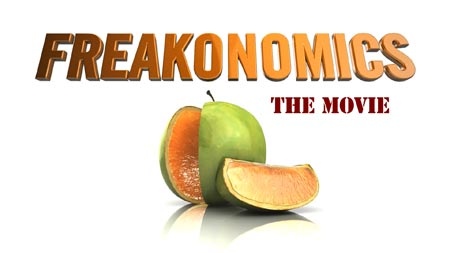Freakonomics is a multi-part documentary based on the immensely popular book of the same name by Steven D. Levitt and Stephen J. Dubner and is an eye opening examination of the various systems in place in our society. Consisting of a triage of extremely talented documentary filmmakers, Freakonomics takes an interesting approach of examining some core economic principles in the book and then permits the filmmaker to illustrate an example of the mentioned topic in their unique cinematic style. These stories take on a debunking conventional thinking approach often throwing accepted concepts at the audience and then subverting their logic in clever ways. By combining a talented roster of documentarians with a phenomenon book, Freakonomics succeeds in both educating and entertaining.
Seth Gordon (King of Kong) takes on the job of weaving together prelude chapters in-between the four short films from the other heavyweight documentary directors including Morgan Spurlock (Super Size Me), Alex Gibney (Enron: The Smartest Guys in the Room, Taxi to the Dark Side), Eugene Jarecki (Why We Fight) and Rachel Grady and Heidi Ewing (Jesus Camp). After a tantalizing prologue where the two authors discuss one of the freaky economic oddities to think about by explaining real estate broker fees and their true incentives to help you get the best offer. This leads into the first short A Roshanda by any Other Name directed by Spurlock which takes a look at the affect that our names have on how your life turns out. Using his trademark fast paced humorous style, Spurlock delivers a fascinating trip into the history of the names culture and how having a certain name might affect your chances at getting a job because of racial and socio-economic context of contemporary America.
This is followed by a blistering examination of one of history’s longest running sports, sumo wrestling, which despite being married to honor and religion is still rife with cheating. Alex Gibney takes a provocative in depth look at the sport of sumo in his segment Pure Corruption which examines freaky data proving that matches are being thrown regularly. Using his intense and probing style, Gibney paints the world of the yaocho that echoes to the corruption he’s exposed in his own previous films. If there’s one thing Gibney and the book is saying, it’s that all games in life are suspect to corruption. Following the thunderous sumo is an animated and minimalist take on Freakonomics done by the very talented Eugene Jarecki.
In perhaps the most controversial segment of the film, Jarecki examines the correlation between the decreased crime rate in major cities during the 90s and the upholding of Roe vs. Wade in the 1973. It’s (Not Always) a Wonderful Life begins by interweaving clips from the classic film in a surrealistic style as it analyzes data almost irrefutable attributing the rise in abortion as a causing factor for the sharp crime decline, raising an even larger question which is what kind of life experience leads to a life in crime? The final chapter of the film is an earnest and heartfelt look at our education system by Rachel Grady and Heidi Ewing. In Can a 9th Grader Be Bribed to Succeed a gritty and intimate look at several students whose reports cards suddenly become much more important for their pockets. This final chapter is a perfect summation of the importance behind not only educating ourselves to better understand the systems that control our lives but also educating the youth who are more likely to become its victims.
8 out 10
What did you think of Freakonomics?


